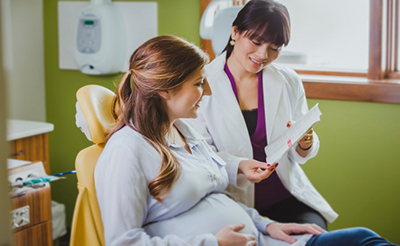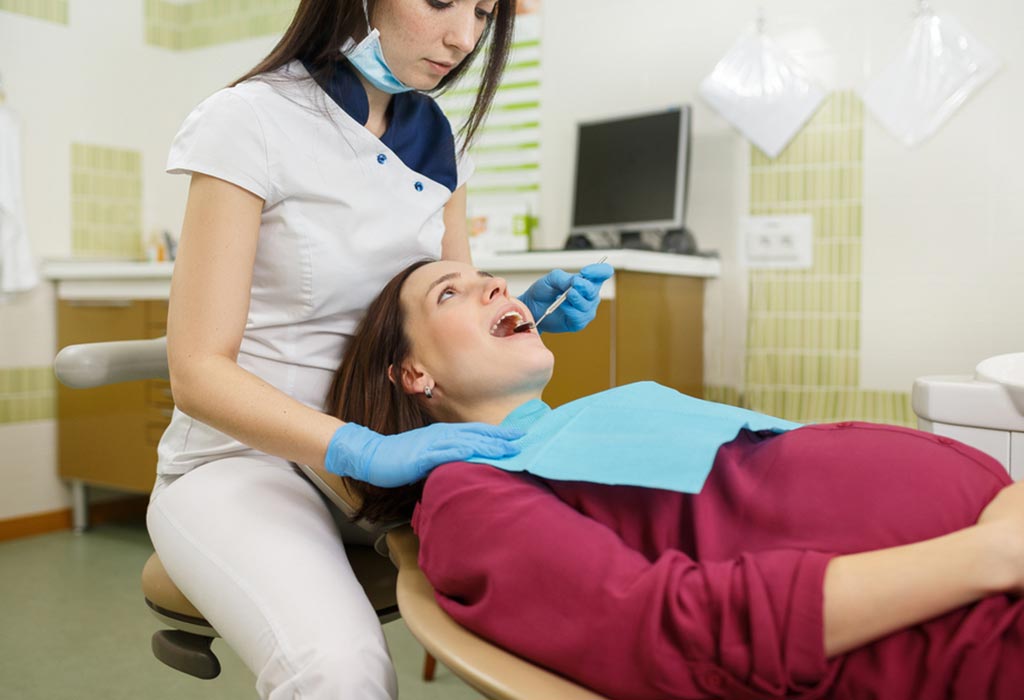Pregnancy is an exciting time that brings many changes to a woman’s body, including the mouth. Professionals agree that of all the physiologic changes that can occur, this is one that is rather consistent and, for some, surprising.
Pregnancy can have a significant impact on the oral health and well-being of an expectant mother. For example, it’s not uncommon for a pregnant woman to experience bleeding gums. This makes maintaining proper dental hygiene and dental checkups important while pregnant. Yet, there are many myths about pregnancy and dental care that are misleading, and these myths discourage pregnant women from receiving routine care.
For this reason and many others, dental professionals have a responsibility to talk to their patients about the importance of consistent preventive dental care during pregnancy. Furthermore, dental professionals must educate these same patients about the potential impact of poor dental hygiene on both mother and child.
Pregnancy: The mouth is connected to the body
There is much discussion these days about oral health education, as well as an intensive effort to understand more about the mouth-body connection. We know, as dental professionals, that what happens in the mouth can affect the rest of the body and vice versa. In the case of pregnancy, a woman’s body goes through profound physiologic and hormonal changes for nine months that can ultimately impact her teeth and mouth. The changing hormones in a woman’s body may depress the immune response, compromise the local defense mechanism necessary for good oral health, and reduce the natural protective function of the gingiva. This can lead to a variety of dental health issues, including pregnancy gingivitis, benign oral gingivitis lesions, tooth mobility, tooth erosion, dental caries, periodontitis, and gums that are more prone to inflammation and bleeding. In fact, it is estimated that 60%–75% of pregnant women have pregnancy gingivitis.
Changes in diet, such as increased snacking due to cravings, as well as increased acidity in the mouth due to morning sickness, dry mouth, and poor oral hygiene can all contribute to the increased risk for oral problems during pregnancy.
Debunk the dental myths
There are many myths related to how oral health affects pregnancy and vice versa. These myths can keep women from getting the dental treatment they need. It is important for dental professionals to be aware of the existing myths and understand the most recent thinking on this topic. Of interest is the fact that in 2011, the federal government convened representatives from the American Dental Association and the American College of Obstetrics and Gynecology to address these issues. Below are some of the salient findings and recommendations:
- Some expectant women have heard that they should not receive x-rays or undergo major dental procedures during pregnancy. However, dental x-rays with proper x-ray aprons are considered safe during pregnancy by the American Dental Association.
- There is a belief that pregnant women should not have topical or local anesthetic while pregnant. However, the use of topical or local anesthetic has not been linked to adverse events or negative outcomes to the mom or baby.
- Many women don’t believe their oral health has an impact on their children. The reality is that a mother’s dental health can directly impact the oral health of her unborn child.
Advocating for preventive care
Every patient is unique, so there isn’t a one-size-fits-all approach to dental health recommendations for expectant mothers. But there are things dentists can do to better inform their patients about what should be done to prevent dental health issues during pregnancy. Pregnant patients should be encouraged to visit the dentist in their first trimester for evaluation and to determine the best course of action for dental care throughout the pregnancy.
Some pregnant women experience morning sickness, which may lead to vomiting and increased acid in the mouth. A dentist should ask if the patient has experienced morning sickness with vomiting. If the patient has, recommend that she rinse her mouth with one teaspoon of baking soda dissolved in a cup of water to neutralize the acid.
Talking to pregnant patients about their diet and the way it impacts their oral health is important. For example, dental professionals should advise expectant mothers to avoid foods and beverages high in sugar, such as juice, candy, fruit-flavored drinks, and soda. A great tip is to recommend patients drink fluoridated water throughout the day, especially between meals.
It is also important to recommend that expectant mothers be more vigilant with their brushing and flossing routine. Gums are usually more permeable during this time, and brushing and flossing at least twice a day can mitigate most dental risks associated with pregnancy, particularly gingivitis and erosion of the enamel surface caused by morning sickness.
Finally, it is important for dental professionals to inform their patients that their dental health could have a direct impact on their babies. Higher levels of untreated tooth caries or tooth loss among mothers is an indicator of higher levels of caries in their children. There is a direct correlation between high levels of S. mutans (the most common bacteria in dental decay) in expectant mothers and their children. At 36 months, a child may begin to show signs of dental caries if its mother exhibits symptoms as well. According to the Centers for Disease Control and Prevention, dental caries remains one of the most prevalent chronic diseases among children in the United States even though it can be prevented with good home care.












